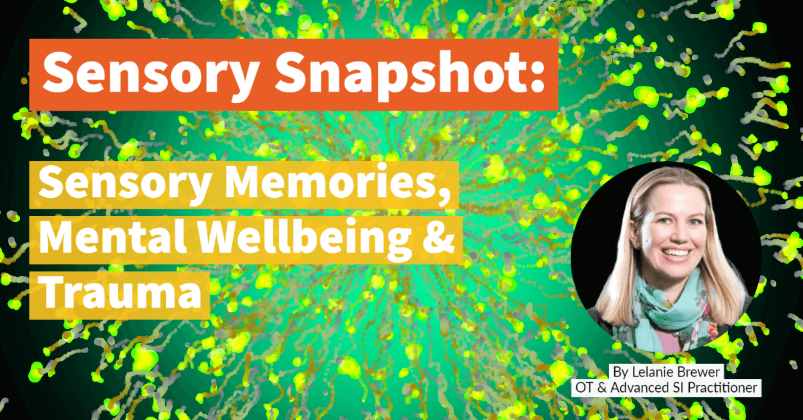Sensory Snapshot: Sensory Memories, Mental Wellbeing and Trauma
By Lelanie Brewer, 13 February 2023

Our sensory experiences shape and inform our world and impact on our daily lives in more ways than we can imagine. Many tastes, sounds and smells can transport us to a different time in our lives and sensory experiences often have memories attached to them that guide our choices, for example, when choosing something to eat or listening to a particular piece of music. This can be calming and soothing when these are good memories and tapping into these experiences can be helpful when we are going through a difficult time.
Now let’s consider the opposite. What sensory experiences have you had that have caused you distress and made you avoid certain situations? Perhaps a certain song reminds you of an unpleasant experience and you never want to hear it again or is there a particular texture that brings back bad memories? In many cases, these can be quite minor and perhaps change the way you do things or avoid certain situations.
But what if your sensory memories are so debilitating that they can contribute to post-traumatic stress and long-term mental health challenges? I recently watched The Swimmers, a true story based on Syrian sisters Yusra and Sara Mardini’s experiences of leaving war torn Syria. Watching this outstanding piece of cinematography through a sensory lens made me think about the impact of ‘sensory memories’ on trauma survivors long after their physical needs have been met.
We know that trauma greatly affects sensory processing integration and that it can drastically alter survivors' responses to sensory experiences. For example, individuals can have emotional reactions they did not have prior to trauma to certain sensory experiences of hearing, seeing, smelling or touching things. A recent study discussed how individuals with sensory processing differences are significantly more likely to present with post-traumatic stress disorder after exposure to war and other traumatic experiences. Another study also looked at how exposure to traumatic stress can cause sensory processing differences.
Following the recent devastating events in Turkey and Syria and ongoing conflict in many parts of the world, we will sadly see a lot more of the impact of traumatic sensory memories and trauma in individuals in years to come. As health care practitioners with expertise in sensory integration, we can make a difference worldwide by recognising the impact of sensory memories when encountering or working with trauma survivors. We can also contribute by sharing awareness with others.
Best wishes
Lelanie Brewer
PS: If you’re interested in finding out more about our upcoming courses focused on sensory integration and trauma, please click here for more details.
Sensory Snapshot is a regular series by Advanced SI Practitioner and OT Lelanie Brewer. Lelanie gained her MSc in OT at Brunel University, London, and is pursuing a PhD with Newcastle University. Experienced in the NHS, charity and private sectors, as well as being a UK university senior lecturer, Lelanie is the Lead for Continuous Professional Development at Sensory Integration Education.

